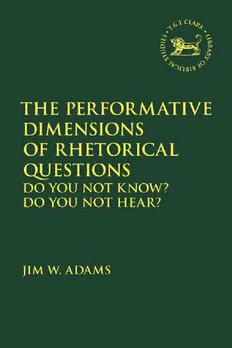Download The Performative Dimensions of Rhetorical Questions in the Hebrew Bible: Do You Not Know? Do You Not Hear? PDF Free - Full Version
Download The Performative Dimensions of Rhetorical Questions in the Hebrew Bible: Do You Not Know? Do You Not Hear? by Jim W. Adams in PDF format completely FREE. No registration required, no payment needed. Get instant access to this valuable resource on PDFdrive.to!
About The Performative Dimensions of Rhetorical Questions in the Hebrew Bible: Do You Not Know? Do You Not Hear?
This book sets out to describe the multi-dimensional nature and function of rhetorical questions in the Old Testament. Biblical scholars have previously analyzed the use of rhetorical questions in both Testaments, but consistently describe their function in persuasive terms. While this understanding is appropriate in a number of instances, many rhetorical questions do not operate this way, and Jim W. Adams focuses in particular on rhetoric expressing the self-involvement of both the speaker and hearer.Among linguistic philosophers, speech act theory has illuminated the fact that uttering a sentence does not merely convey information; it may also involve the performing of an action. The concept of communicative action provides additional tools to the exegetical process as it points the interpreter beyond the assumption that the use of language is merely for descriptive purposes. Language can also have performative and self-involving dimensions. In relation to speech act theory, linguistic specialists continue to research the nature of rhetorical questions.
Detailed Information
| Author: | Jim W. Adams |
|---|---|
| Publication Year: | 2020 |
| ISBN: | 9780567695581 |
| Pages: | 307 |
| Language: | English |
| File Size: | 2.13 |
| Format: | |
| Price: | FREE |
Safe & Secure Download - No registration required
Why Choose PDFdrive for Your Free The Performative Dimensions of Rhetorical Questions in the Hebrew Bible: Do You Not Know? Do You Not Hear? Download?
- 100% Free: No hidden fees or subscriptions required for one book every day.
- No Registration: Immediate access is available without creating accounts for one book every day.
- Safe and Secure: Clean downloads without malware or viruses
- Multiple Formats: PDF, MOBI, Mpub,... optimized for all devices
- Educational Resource: Supporting knowledge sharing and learning
Frequently Asked Questions
Is it really free to download The Performative Dimensions of Rhetorical Questions in the Hebrew Bible: Do You Not Know? Do You Not Hear? PDF?
Yes, on https://PDFdrive.to you can download The Performative Dimensions of Rhetorical Questions in the Hebrew Bible: Do You Not Know? Do You Not Hear? by Jim W. Adams completely free. We don't require any payment, subscription, or registration to access this PDF file. For 3 books every day.
How can I read The Performative Dimensions of Rhetorical Questions in the Hebrew Bible: Do You Not Know? Do You Not Hear? on my mobile device?
After downloading The Performative Dimensions of Rhetorical Questions in the Hebrew Bible: Do You Not Know? Do You Not Hear? PDF, you can open it with any PDF reader app on your phone or tablet. We recommend using Adobe Acrobat Reader, Apple Books, or Google Play Books for the best reading experience.
Is this the full version of The Performative Dimensions of Rhetorical Questions in the Hebrew Bible: Do You Not Know? Do You Not Hear??
Yes, this is the complete PDF version of The Performative Dimensions of Rhetorical Questions in the Hebrew Bible: Do You Not Know? Do You Not Hear? by Jim W. Adams. You will be able to read the entire content as in the printed version without missing any pages.
Is it legal to download The Performative Dimensions of Rhetorical Questions in the Hebrew Bible: Do You Not Know? Do You Not Hear? PDF for free?
https://PDFdrive.to provides links to free educational resources available online. We do not store any files on our servers. Please be aware of copyright laws in your country before downloading.
The materials shared are intended for research, educational, and personal use in accordance with fair use principles.

